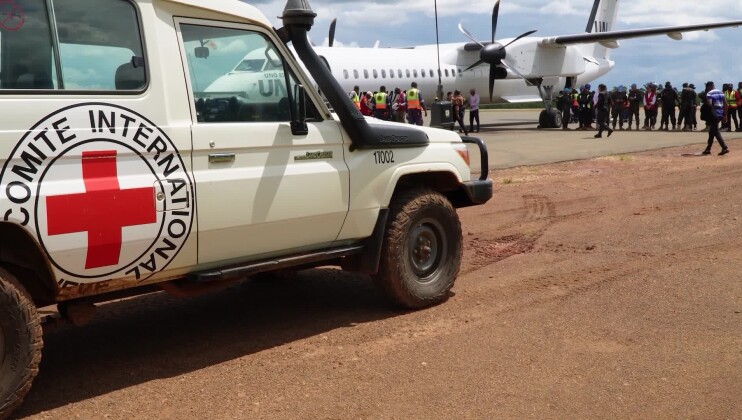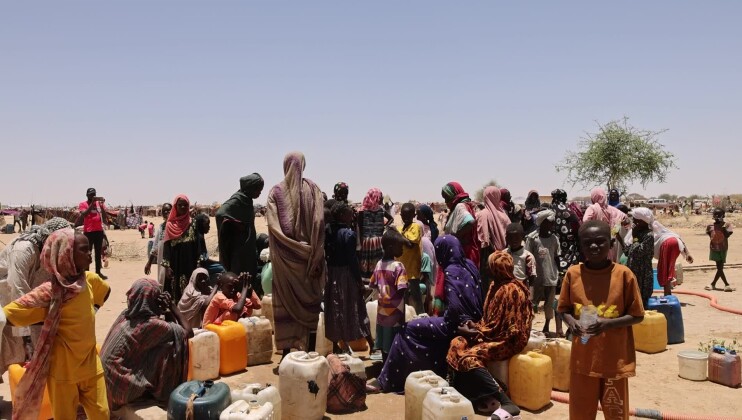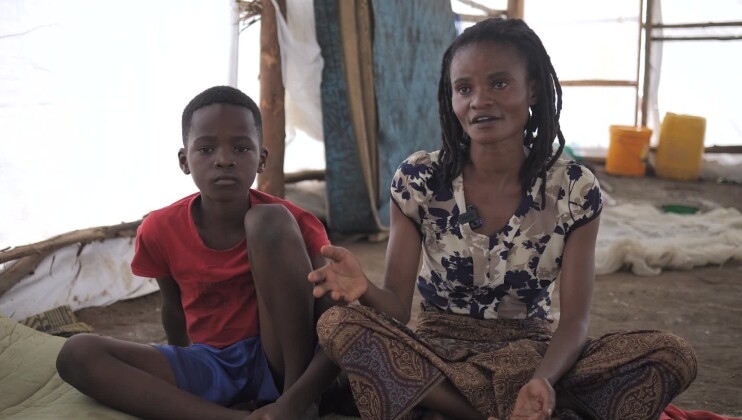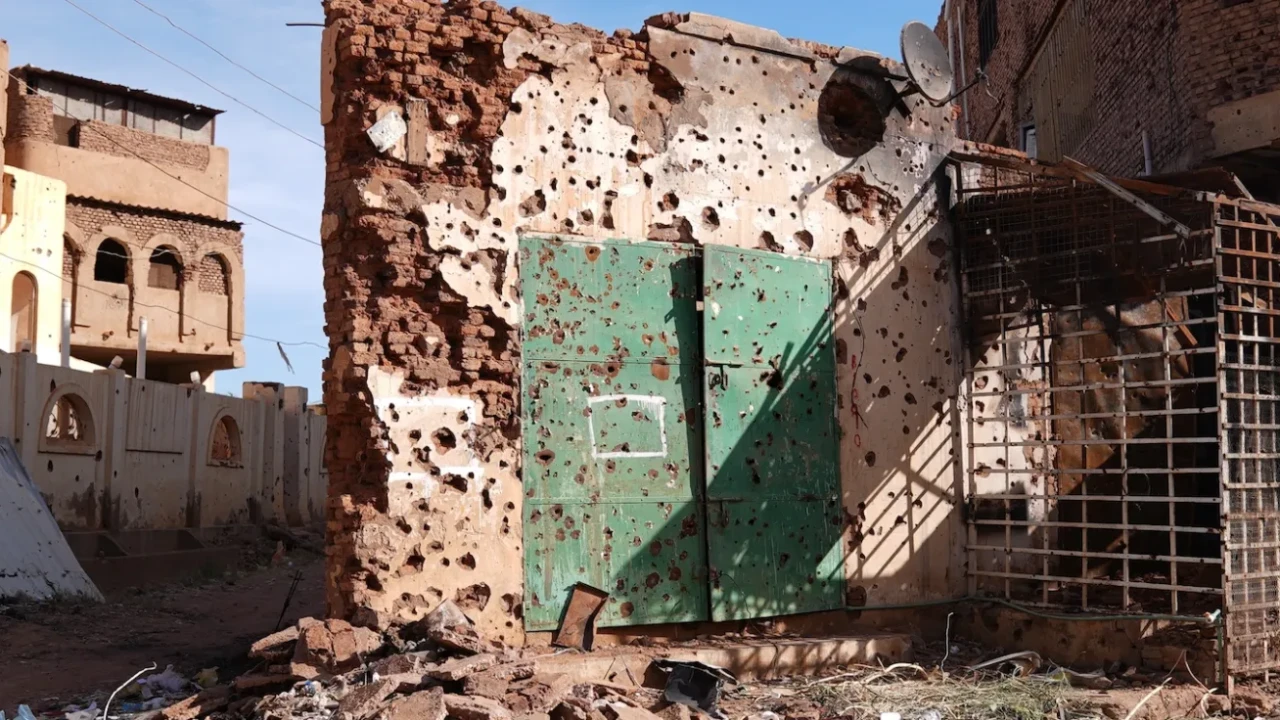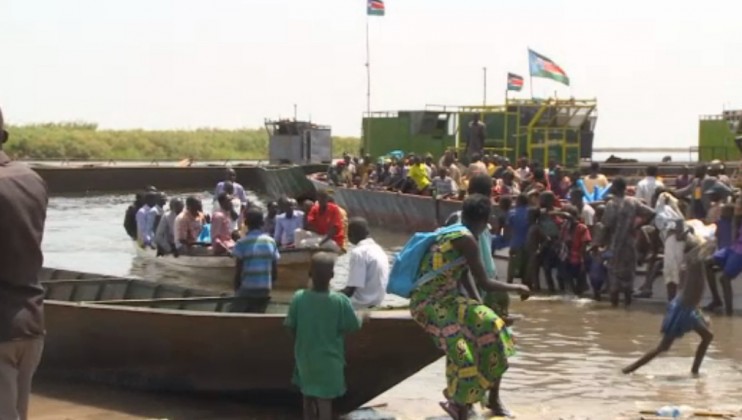
This is a modal window.
Hundreds of thousands of people are living in the open air on arid land scattered across the country. For humanitarian organizations, many of these areas are hard to reach geographical and because of a lack of safe access.
In Minkamen, an area with tens of thousands are seeking shelter, many people are afraid, brokenhearted and angry. Forced to abandon their homes because of the ongoing violence, they have arrived here with barely any belongings or nothing having walked for several days under the sun and during the cold nights. Many had to cross the Nile, the lucky ones in overcrowded boats, while others swam across, in a desperate bid to save their lives.
Women, young children and the elderly make up the majority of the population in Minkamen and are living in these desperate conditions. They are in dire need of shelter, food, water and medical care.
Jar Ahen managed to escape Bor despite her advancing years and seek safety in Minkamen with her children and grandchildren. She is sleeping in the open air which will be even more difficult when the rains arrive:
“In my home, I used to drink milk and I slept in my own house," says Ahen. "Everyone was killed there. Now I have nothing. The children here are suffering from the cold. I'm afraid they will also die because they are sick. It is windy and that is a problem. I have no life."
Yar Dut Atem, mother of three, came here from Bor without her husband. She also worried about the health of her children: “My children are coughing and have diarrhea. Since we arrived here, we are living under the tree and the weather is cold and then hot. When we fall sick, it is very difficult. We go the nearby clinics and the only medicine they have is for headaches.”
The International Committee of the Red Cross, in the largest distribution so far, is providing sorghum, beans and oil to over 90,000 people in Minkamen over a 3 week period in an effort to alleviate people’s precarious food situation.
Atem says: “The food that you see here under the tree is for my three children and I, but there are relatives staying with us and we have to share all this food.”
ICRC's Daniel Gagnon says: “These people are living under very hard conditions. They left their home towns and villages to seek safety in December and January. They have come here with basically nothing. Most of them are still living under trees. And we are providing at least the basic food rations to get them through. “
As the volatile situation continues and people do not feel secure enough to return home people's needs and vulnerability are prolonged.
Gagnon explains: “Basically the ICRC is here to alleviate suffering and maintain some sort of dignity for these people, as we are now the sole providers of food rations at this time in this camp.”
An ICRC priority is to improve the safe access of water to all those displaced using the means available, like in some cases pumping out water from the Nile itself and treating it. The ICRC has already provided clean water for nearly 40,000 displaced people in Juba, Malakal, Bentiu, Wunrok, Waat and Lankien.
Ahead of the rainy season, the ICRC is increasing it's capacity to assist people with food, shelter and items to make communities self-sufficient such as fishing kits. The ICRC has already provided tents and tarpaulins as emergency shelter for nearly 112,000 displaced people around the country.
Facts and Figures
Since the crisis erupted on 15 December 2013, in cooperation with the South Sudan Red Cross and with the support of the Kenya Red Cross Society and several Red Cross societies, the ICRC has also:
- provided clean water for nearly 40,000 displaced people in Juba, Malakal, Bentiu, Wunrok, Waat and Lankien;
- provided food for over 110,000 people in Wau, Bentiu, Juba, Minkamen and Malakal;
- provided tents and tarpaulins as emergency shelter for nearly 112,000 displaced people around the country;
- provided cooking utensils, emergency shelter materials, jerrycans, blankets and other household essentials for over 100,000 people;
- delivered fishing equipment to nearly 17,000 people in Awerial County;
- visited over 1,630 people held in various places of detention;
- arranged for more than 1,500 phone calls to be made from various camps to enable displaced people to contact family members;
- registered 27 children separated from their families.
Shotlist
Location: Minkamen, South Sudan
Length: 6.45
Format: HDV and SD
Producer: Marco Yuri Jimenez Rodriguez
Camera: Christopher Nicholas
Sound: English
ICRC ref: AV158N1 South Sudan
Date: 21 January 2014
Copyright: ICRC access all
00:00 Aerial view of Minkamen and port on Nile where displaced people arrived from.
00:09 Port at Minkamen on Nile where displaced people arrived from.
00:17 GV of people living in the open with no shelter under the trees.
00:21 C/U of two children
00:31 GV children next to piles of personal belongings heaped under trees.
00:45 Yar Dut, mother of three surrounded by wider family.
00:50 Child flying kite made of plastic bag
01:04 Dirty ground and children standing near makeshift shelters
01:15 SOUNDBITE Jar Ahen, elderly woman from Bor:
“In my life, when I was in my home I used to drink milk and I slept in my own house. Everyone was killed there. Now I have nothing. These children who are staying here are suffering from the cold. I'm afraid they will also die because they are sick. It is windy and that is a problem. I have no life. “
02:02 Pan up from children on floor up to face of Yargot, mother of three.
02:10 SOUNDBITE Yar Dut Atem, mother of three:
“My children are coughing and have diarrhea. Since we arrived here we are living under the tree and the weather is cold and then hot. When we fall sick, it is very difficult. We go the nearby clinics and the only medicine they have is for headaches.”
02:36 Pan from Awerial County sign post to ICRC trucks loaded with food and non-food items arriving in Awerial County on way to Minkamen.
02:44 Unloading ICRC goods at main distribution point in Minkamen.
02:51 Women walking towards distribution point.
02:56 Women queuing up at distribution point.
03:04 South Sudan Red Cross volunteer checking food cards.
03:10 Yargot in queue waiting to pick up supplies from ICRC.
03:15 Women walking to food piles that are arranged according to family size.
03:18 Yargot walking towards food piles.
03:24 W/S of Yargot and woman sharing out the oil.
03:35 C/U Yargot’s face.
03:38 C/U sharing out the oil.
03:47 Yargot putting supplies on head and walking and setting off on journey to where she is sleeping.
03:57 Yar Dut Atem walking
04:05 C/U Yar Dut Atem’s feet
04:09 Yar Dut Atem arriving back where family is sheltering under a tree.
04:32 SOUNDBITE Yar Dut Atem:
“The food that you see here under the tree is for my three children and I, but there are relatives staying with us and we have to share all this food. If we were at our home, it would be food for only two or three days.”
04:59 Daniel Gagnon Ecosec delegate at distribution point briefing South Sudan Red Cross volunteer.
05:08 SOUNDBITE Daniel Gagnon, Ecosec Delegate, ICRC:
“These people are living under very hard conditions. They left their home towns and villages to seek safety in December – January. They have come here with nothing basically. Most of them are still living under the trees. And we are providing at least the basic food rations to get them through. “
05:29 SOUNDBITE Daniel Gagnon, Ecosec Delegate, ICRC:
“So the ICRC is providing food rations for one month. We are providing potable water. And also protection services linked to family reunification, through telephone calls so they can reach their loved ones and tell them where they are. “
05:47 SOUNDBITE Daniel Gagnon, Ecosec Delegate, ICRC:
“Basically the ICRC is to alleviate suffering or maintain some sort of dignity for these people, as we are now the sole providers of food rations at this time in this camp.”
05:59 ICRC trucks travelling across bridge on way from Juba to Minkamen filled with food and other essential goods.
06:07 C/U Girl panning down to tap installed by ICRC.
06:15 Women filling up containers at taps installed by ICRC.
06:19 Banks of Nile at Minkamen where water is drawn from and processed and purified.
06:25 Water bladder used to process water and supply taps.
06:40 Woman with water container on head surrounded by other women.
